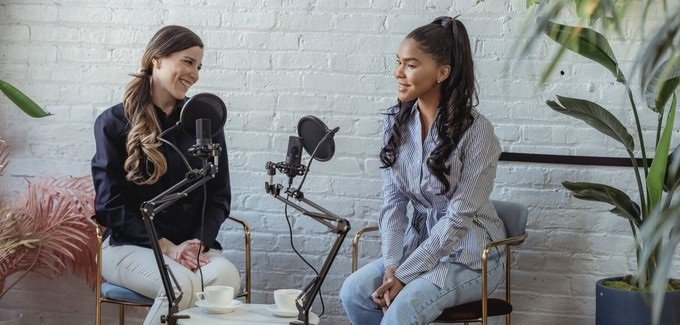Introduction
In a world where consumers are increasingly conscious of their impact on the planet, the ethical fashion movement has grown significantly. From sustainable production practices to fair wages and eco-friendly materials, the demand for transparency in the fashion industry has never been higher. This shift is also reflected in the rise of ethical fashion podcast, which have become a key resource for educating listeners and inspiring change in the industry.
This article will dive deep into the concept of ethical fashion podcasts, their role in shaping sustainable fashion choices, and how they contribute to a more informed and ethical consumer base. We’ll also explore the top podcasts in this niche, key topics they discuss, and how the podcast format plays a crucial role in advocating for a better fashion future.
What is Ethical Fashion?
Ethical fashion is a movement that advocates for the fair treatment of workers, environmentally sustainable practices, and a reduction in the exploitation of resources. It includes both the environmental and social aspects of the fashion industry. Ethical fashion covers everything from the sourcing of raw materials to the treatment of workers, ensuring that every part of the process meets ethical standards.
The rise of ethical fashion has been driven by concerns over the environmental impact of fast fashion, the exploitation of garment workers in developing countries, and the growing awareness among consumers about the need for sustainable choices. The ethical fashion movement aims to address these issues by promoting:
- Fair Trade Practices: Ensuring that workers are paid fair wages and work in safe, healthy environments.
- Eco-Friendly Materials: Promoting the use of sustainable fibers and reducing waste and pollution.
- Transparency: Encouraging fashion brands to be open about their production processes and supply chains.
Ethical fashion podcasts are a vital part of this movement, providing a platform for experts, designers, and consumers to discuss these issues in-depth and create solutions for a better, more sustainable future.
The Role of Podcasts in the Ethical Fashion Movement

Podcasts are an effective tool for raising awareness and sharing information. They allow experts and thought leaders to engage with listeners on topics they may not have encountered before. Ethical fashion podcasts provide a space for in-depth discussions about topics like sustainable fashion, fair trade, and eco-friendly production practices. These podcasts are accessible, easy to consume, and can reach a global audience.
Some of the primary roles that ethical fashion podcasts play include:
- Education: Podcasts are an excellent source of information for listeners who want to understand more about sustainable fashion. They offer discussions on everything from the impact of synthetic fibers on the environment to the role of supply chains in garment production.
- Awareness Building: Many ethical fashion podcasts focus on raising awareness about issues like the exploitation of garment workers, the environmental damage caused by fast fashion, and the benefits of shopping sustainably. This helps listeners make more informed decisions when shopping for clothing.
- Inspiration: By highlighting the work of sustainable designers and entrepreneurs, ethical fashion podcasts inspire others to start or support ethical fashion brands. They showcase how fashion can be beautiful, ethical, and sustainable.
- Community Engagement: Podcasts provide a platform for discussions around ethics in fashion. Listeners can engage with the hosts and other community members, sharing their thoughts, experiences, and recommendations.
Why Should You Listen to an Ethical Fashion Podcast?
There are several reasons why listeners should tune in to an ethical fashion podcast. Whether you’re an avid fashion enthusiast, an environmental advocate, or someone looking to make more responsible purchasing decisions, these podcasts offer valuable insights and inspiration.
1. Understanding Sustainable Fashion Choices
One of the key reasons to listen to ethical fashion podcasts is to understand the importance of sustainable fashion choices. Ethical fashion is not just about buying clothes made from organic cotton or recycled materials. It also includes understanding the environmental and social costs of the fashion industry.
Podcasts often feature discussions on topics like:
- The impact of clothing production on climate change.
- The exploitation of workers in the global garment industry.
- Ways to reduce your carbon footprint through mindful purchasing decisions.
By learning from these podcasts, listeners can gain a better understanding of the fashion industry and make more informed choices when shopping.
2. Supporting Ethical Brands and Designers
Ethical fashion podcasts frequently feature interviews with ethical designers, entrepreneurs, and activists who are working to change the fashion industry for the better. By listening to these stories, you can discover ethical brands that align with your values and learn about the people behind them.
Supporting ethical fashion brands helps promote the movement towards a more sustainable fashion industry. Podcasts often provide valuable insights into how these brands are making a difference, from their sourcing practices to the ethical values they uphold.
3. Staying Informed About Industry Trends
The fashion industry is constantly evolving, and staying informed about the latest trends in sustainability is essential for any conscious consumer. Ethical fashion podcasts often cover the latest developments in sustainable fashion, from new eco-friendly materials to cutting-edge fashion technology that reduces waste and pollution.
By keeping up with these trends, you can be part of the movement toward creating a more sustainable future for fashion.
4. Building a Community of Like-Minded Individuals
Ethical fashion podcasts often cultivate a community of listeners who share similar values. Whether you’re interested in fashion or simply want to make more sustainable lifestyle choices, listening to these podcasts can connect you with like-minded individuals. Many podcasts have online communities where listeners can engage, share ideas, and discuss the topics covered in episodes.
Top Ethical Fashion Podcasts to Tune Into

There are many great ethical fashion podcasts that provide valuable insights and in-depth discussions about the fashion industry. Here are some of the top podcasts that anyone interested in sustainable fashion should listen to:
1. The Conscious Chatter Podcast
The Conscious Chatter podcast is one of the most popular podcasts in the ethical fashion space. Hosted by Kestrel Jenkins, this podcast focuses on the intersection of fashion, sustainability, and ethics. Each episode features interviews with industry experts, designers, and activists who are working to promote ethical fashion practices.
2. Sustainable Fashion Matters Podcast
The Sustainable Fashion Matters Podcast is hosted by a group of sustainable fashion advocates and features interviews with a variety of industry experts. Topics covered include eco-friendly fabrics, fair trade practices, and innovative design techniques that minimize environmental impact. This podcast is perfect for anyone wanting to dive deeper into the technical side of sustainable fashion.
3. The Slow Fashion Pod
The Slow Fashion Pod focuses on the slow fashion movement, advocating for a shift away from fast fashion and toward more sustainable, mindful fashion choices. Hosts discuss topics like circular fashion, zero waste, and the ethics of production. This podcast is ideal for anyone who wants to learn more about slow fashion and how it can benefit both the environment and garment workers.
4. Wardrobe Crisis Podcast
Hosted by Clare Press, the Wardrobe Crisis Podcast dives into the complex issues surrounding fashion and sustainability. Clare interviews fashion industry insiders, activists, and experts to discuss everything from textile waste to the future of sustainable fashion.
Key Topics Ethical Fashion Podcasts Cover
The ethical fashion podcast space is vast, and hosts typically cover a wide range of topics related to sustainability and the fashion industry. Some of the most popular themes include:
| Topic | Description |
|---|---|
| Sustainable Fabrics | The use of organic, recycled, and natural materials in fashion production, such as organic cotton, hemp, and Tencel. |
| Fair Trade Practices | Ensuring that workers in developing countries are paid fair wages and work in safe conditions. |
| Circular Fashion | Promoting the reuse and recycling of garments to minimize waste and reduce the need for new raw materials. |
| Ethical Sourcing and Production | Focusing on transparency in the supply chain and ensuring that fashion brands source materials and labor responsibly. |
| Fashion Waste Reduction | Discussing ways to reduce textile waste, including upcycling, second-hand shopping, and zero-waste fashion designs. |
| Innovative Sustainable Fashion | Exploring new technologies and design methods that minimize environmental impact, such as 3D printing and sustainable dyeing methods. |
How Ethical Fashion Podcasts Are Influencing Consumers
Ethical fashion podcasts play an essential role in influencing consumer behavior. They educate listeners about the true cost of fast fashion and encourage more sustainable purchasing habits. By featuring interviews with ethical designers and sustainability experts, these podcasts help listeners understand the impact of their fashion choices and inspire them to take action.
As the popularity of these podcasts grows, they contribute to a wider cultural shift toward sustainability and ethics in fashion.
Conclusion
Ethical fashion podcasts are an invaluable resource in the fight for a more sustainable and equitable fashion industry. They educate listeners, raise awareness, and inspire change by showcasing the hard work of ethical designers, activists, and thought leaders.
